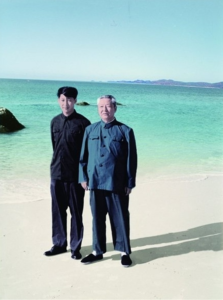By Austin.Thomas@awokonewspaper.sl
Beijing, CHINA – China as many countries around the world have seen, how families have been instrumental in the development or destruction of a nation, where father and son have been presidents, or wife and husband, brothers or uncle and nephew have been in office.
In China the current President and General Secretary of the Communist Party of China (CPC) Xi Jinping and his father Xi Zhongxun have served in the highest body of the party – the Standing Committee of the CPC.
Xi Zhongxun died at the age of 89 on October 15, 2002. Before his death he served as China’s vice premier between 1959 and 1965 and vice chairman of the 5th and 7th National People’s Congress (NPC) Standing Committee. Xi Zhongxun was praised as a great Communist fighter, an outstanding proletarian revolutionary and a distinguished political leader of the Party and military.
As a military commander, Xi Zhongxun was the political commissar of Northwest military region, and was said to have been the strongest Commissar at that time, which makes many people not to be surprised as the second son President Xi has been in such an excellent form as the leader of China.
Xi was also praised for his efforts in perfecting the NPC system and developing socialist democracy and rule of law when he worked with the NPC standing committee. To commemorate his 100th birthday China has published a series of books on Xi Zhongxun, a respected Communist elder and former vice-premier of China, to commemorate what would have been his 100th birthday on Tuesday 15th October in 2013, 210 selections from the late revolutionary papers, 98 articles on recollections about him by his comrades in arms, colleagues and relatives, as well as hundreds of photographs featuring his work and life experiences were published.
The publication according to research was aimed to commemorate and promote his achievements, revolutionary spirit and leading examples.
Born on October 15, 1913, in Fuping County, Shaanxi Province, a peasant family, accepted revolutionary ideas in his early years and participated in progressive student groups. He joined the Communist Youth League of China in May 1926. In the spring of 1928, he participated in the patriotic student movement and was imprisoned by the Kuomintang authorities. He later became a member of the CPC in prison.
At the beginning of 1930, he was appointed by the Party organization to the Yang Hucheng Department of the Northwest Army of the Kuomintang to do the work of military transport, and served as the secretary of the Communist Party of China’s battalion committee.
In March 1932, he organized and launched the “Liangdang Mutiny” and served as the secretary of the Fifth Detachment of the Shaanxi Gansu Guerrilla of the Chinese Workers and Peasants Red Army. In September of the same year, he entered the Weibei Revolutionary Base and served as the political instructor of the Second Detachment of the Weibei Guerrilla.
In February 1933, he served as the secretary of the Communist Youth League Sanyuan Central County Party Committee, engaged in armed struggle, peasant movement and youth work. After March of the same year, he worked hard with Liu Zhidan and other comrades to establish a revolutionary base in the Zhaojin Shaanxi Gansu Border Region.
Xi Zhongxun indeed served the northwest region of China in every capacity and was very instrumental in the successes they made during ‘The Long March’ to victory.
After the victory of the Anti-Japanese War, he successively served as the secretary of the Northwest Bureau of the CPC Central Committee, the political member of the Shaanxi Gansu Ningxia Shanxi Suiyuan Joint Defense Army, the political member of the Shaanxi Gansu Ningxia Field Group Army, and the deputy political member of the Northwest Field Army. Under the instruction of Comrade Mao Zedong, he organized and instigated the uprising of the Kuomintang security team in northern Shaanxi, responded to Comrade Wang Zhen and led the 359 Brigade to break through the Central Plains and return to Yan’an, and participated in commanding the Xihua Lake battle.
He made outstanding contributions to the liberation of the northwest and the whole of China.
After the founding of New China, he served as a member of the Central People’s Government, a member of the Chinese People’s Revolutionary Military Commission, the Second Secretary of the Northwest Bureau of the CPC Central Committee, the Vice Chairman and Acting Chairman of the Northwest Military and Political Commission, the Vice Chairman of the Northwest Administrative Commission, and a political member of the First Field Army and the Northwest Military Region. He presided over the comprehensive work of the Party, government, and military in the Northwest for a long time.
In September 1952, he was transferred to the post of Director of the Propaganda Department of the Central Committee of the Communist Party of China, Deputy Director of the Culture and Education Committee of the Government Council, and Secretary of the Leading Party Group.
After September 1953, he successively served as the Secretary General of the Government Affairs Council and the Secretary General of the State Council. In September 1956, he was elected as a member of the Central Committee at the Eighth National Congress of the Party. In April 1959, he served as Vice Premier and Secretary General of the State Council, responsible for the executive work of the State Council.
In September 1962, at the Tenth Plenary Session of the Eighth Central Committee of the Communist Party of China, Kang Sheng framed him because of the so-called “Liu Zhidan” novel problem, and he was brutally persecuted during the “Cultural Revolution”. He was censored, imprisoned, and guarded for 16 years. He has always maintained a firm belief in communism. After the Third Plenary Session of the Eleventh Central Committee, the Party was completely rehabilitated.
After April 1978, he successively served as the Second Secretary and First Secretary of the CPC Guangdong Provincial Committee, the Governor of Guangdong Province, the First Political Commissar and the First Secretary of the Party Committee of the Guangzhou Military Region. He was co elected as a member of the Central Committee at the Third Plenary Session of the 11th CPC Central Committee.
In September 1980, he was elected Vice Chairman of the Standing Committee of the Fifth National People’s Congress and later concurrently served as Chairman of the Legislative Affairs Committee, presided over and discussed many draft laws.
In March 1981, he took part in the work of the Secretariat of the CPC Central Committee. In June of the same year, he was elected Secretary of the Secretariat of the Central Committee at the Sixth Plenary Session of the 11th CPC Central Committee. In September 1982, he was elected as a member of the Political Bureau of the Central Committee and secretary of the Secretariat at the First Plenary Session of the Twelfth Central Committee of the Communist Party of China, responsible for the daily work of the Secretariat.
In April 1988, he was elected Vice Chairman of the Standing Committee of the Seventh National People’s Congress and Chairman of the Interior and Justice Committee.
He was the Secretary of the Secretariat of the Eleventh Central Committee of the CPC, a member of the Political Bureau of the Twelfth Central Committee and Secretary of the Secretariat, and the Vice Chairman of the Standing Committee of the Fifth and Seventh National People’s Congress.
Well he was unable to reach the pinnacle of the CPC, but indeed groomed his second son Xi Jinping who followed his dad’s footstep and rose to be the General Secretary and President of China in the last 10 years and counting.
As they say the Apple does not fall far from the tree. Today Xi Zhongxun is no more, but his legacy and hard work to build the CPC has never been forgotten as all those he read his history are proud of him because he made someone that he believes would surpass him and continue the liberation process in the land called China.
Just few days ago, Xi Jinping was elected again as the General Secretary of the CPC and President of China for another term, because of his commitment, hard work, sincerity and the wheel to win every battle that comes his way.
69-year-old President Xi, once again in front of reporters and the whole wide world as the Party’s top leader, vowed to lead the country to pursue national rejuvenation through a Chinese path to modernization.
“We shall keep in mind the Party’s nature and purpose and our own mission and responsibility, and work diligently in the performance of our duty, to prove worthy of the great trust of the Party and our people.”
Under his leadership just like his father of old, we see China has witnessed historic changes, with its economy more than doubling to 114 trillion yuan (16 trillion U.S. dollars), absolute poverty wiped out and moderate prosperity attained for the country’s 1.4 billion people.
Xi said that Chinese modernization is a great yet enormous undertaking. The enormity of the task is what makes it great and infinitely glorious.
“The journey ahead is long and arduous, but with determined steps, we will reach our destination.”


